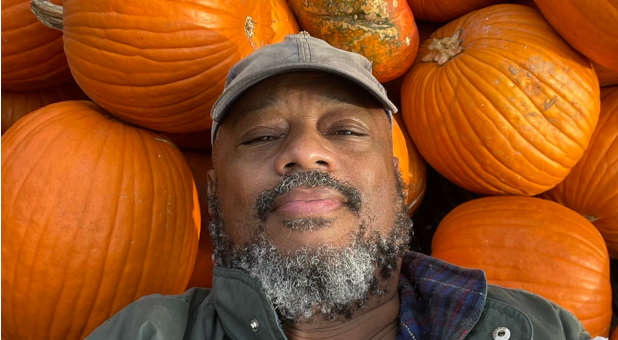Non-Traditional Church Congregants Find New Way to Praise Jesus ‘Down in the Dirt’
Read Time: 3 Minutes 11 Seconds
Three years ago, Chris Battle walked away from his pastoral duties after three decades of leading Black Baptist churches in Tennessee. Battle left, he told NPR.org, because he wasn’t seeing much of a connection among people, the unity in the body that Jesus Christ died for.
Battle says he felt like people were turned off by sermons, pitches for money and the “Sunday morning formality of all of it.”
“I said to myself, ‘maybe we need to do church differently,'” Battled says. “But what does that look like? I didn’t know until I got to the garden.”
The garden Battle refers to is Battlefield Farm & Gardens in East Knoxville, Tenn., a community garden on the property of Tabernacle Baptist Church in Knoxville. It is an urban farm with the mission of transforming the community’s relationship to land and food. It is a ministry working to end food insecurity by partnering with community members to make fresh food accessible and to cultivate land-based sovereignty through education, workforce development and direct relationship to land, their website states.
Members of Battlefield Farm & Gardens grow vegetables and sell them at a farmer’s market. They also collect unsold produce from around the city and deliver it to people in public housing once a week.
So, what does this have to do with Jesus and with the kingdom? Battlefield Farm & Gardens has become a solid alternative for those who have grown weary of the intricacies of traditional church. With American Christianity experiencing an identity crisis as church attendance continues a steep decline, Christian leaders are scrambling to experiment with new ways to offer meaning in people’s lives. NPR reported that “most of the people who show up at Battlefield Gardens on Sunday mornings say they are looking for a faith community, but are burned out on traditional religion.”
On Sunday morning, Battle delivers a brief sermon on Jesus’ teachings, and members of the congregation talk about it. Afterward, Battle’s “congregation” tends to the 50 raised beds of kale and eggplant, string beans and squash, tomatoes and greens, the chicken coop and the compost pile, NPR reported.
“People, when they come to the garden, they have conversations with you,” Battle told NPR. But you tell ’em you’re a pastor, the conversation changes. They hide their liquor. They quit cussin.’ I mean, everything changes.
“But you tell ’em you’re a farmer, and they start telling you what color their thumb is. And I’m like, wow. Developing relationships with people in the garden. And it’s not happening in church. People are running away from the church.”
Kelly Sauskojus, a 27-year-old PhD candidate in English, told NPR she’s a “refugee from fundamentalist churches.
“Generally I’m here because I want two things out of church,” she says. “I want time to sit down, like we do on Sundays sometimes, or around the fire and pray and center and figure out what we’re about in the world.
“The world is very noisy. Then, I want a church to get [expletive] done with your community and for your community.”
While Christian leaders watch their congregations dwindle, some in the Knoxville area say people still yearn for spirituality.
“Just because you leave organized religion doesn’t mean the hunger to connect with the divine is going to cease,” says Rev. Caroline Vogel, the associate rector and director of Spiritus Knox, a center for spiritual learning and practice at the Episcopal Church of the Ascension in Knoxville.
Since the pandemic, many have spurned assembling inside a church building for watching live-streamed services on the internet or on TV. Membership in houses of worship in 2021 fell below 50% for the first time since Gallup started its authoritative religion survey, NPR reports.
In 2020—before the pandemic—only 47% of Americans belonged to a church. NPR reported that attendance has been trending downward since 2000 because young people are rejecting organized religion.
In the case of Battlefield Farm, this “church” offers a different kind of spiritual community where people can show up for Bible lessons and dig in the dirt.
“We’re trying to create this community that people can learn to love each other and ultimately love other people and transform this world. … through collard greens and okra,” Battle told NPR. {eoa}
Bring Charisma magazine home with a subscription today!
Shawn A. Akers is the online editor at Charisma Media.
















































